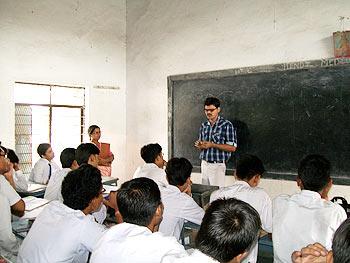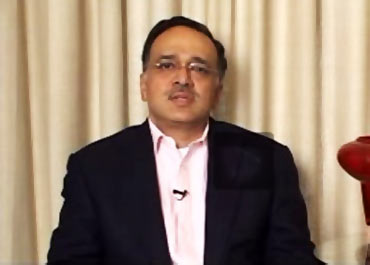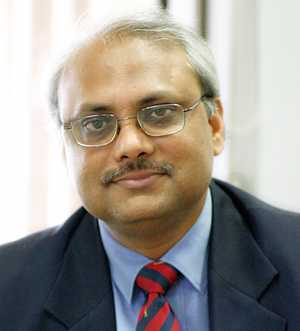Photographs: Rediff Archives Prasanna D Zore
Two scholarship programmes, one designed for undergraduates who want to assume the mantle of leadership at a young age and the other for those youngsters who want to do something different from others were recently unveiled by the Indian School of Business and the Young India Fellowship programme headed by former founder dean of ISB Dr Pramath Raj Sinha.
Aptly titled Young Leadership Programme and Young India Fellowship, both want to attract young talent to its fold and provide the youth with leadership opportunities during the college course which could later be used in the corporate world.
Young India Fellowship wants to bring together 50 young women and men from different parts of the country and offer a one-year residential post graduate programme in Delhi.
Prasanna D Zore spoke to Dr Pramath Raj Sinha of YIF and Deepak Chandra, deputy dean of the ISB to find out what these programmes are all about and how will they benefit young Indian students.
.
'We want students who are willing to take risks'
Image: Dr Pramath Raj SinhaDr Pramath Raj Sinha on Young India Fellowship...
Tell us about YIF and the need to design such a programme...
We feel that in India the focus in our undergraduate education system has become very, very specialised. So what happens is once you enter, you choose a subject and that's all you study. Most people want to get a job so they study engineering, commerce, computers etc and end up studying only subjects in that discipline. Not only that, they end up preparing to get into those disciplines from Class VIII onwards.
So what is happening is at a very young age when your education should be much broader and expose you to many different fields so that you understand your interests and choose what you want to study in higher classes, explore and see where your passion truly lies, the opportunity is lost when you start preparing for competitive exams from a very young age.
Generally, around the world even during your undergraduate studies you get a much broader education. We feel that our talent pool is suffering because we have people with tunnel vision who know their subject and have no perspective about outside subjects.
At the same time the challenges one faces are becoming more complex. I'd want people to have perspectives on many things: politics, economics, history, environment, climate etc.
Our attempt is to somehow try and change that and bring about a greater focus on multi-disciplinary education at the undergraduate level. Now, we cannot obviously change the whole world but we want to take a small step by instituting this scholarship that is structured like a fellowship.
The idea is you choose the best and most deserving students from around the country who want to do something different, who are willing to take some risks.
How will you choose these best students?
We will ask them to apply; we will look at their credentials; we will interview them; we will ask them to take tests. It will be like any other selection process. The other thing is, we will choose students who want to do something different, make a difference and change the world.
I will give you an example.
There is a student who is an engineer who used to be a sportsperson. Now, his parents insisted that he couldn't go full-time into sports so he became an engineer. But what if he feels that he really wants to make a difference to sports administration. Now, he is looking for mentorship, for a different programme that will enable him to make that transition. YIF can be a great programme for somebody like this student.
Tell us about this course...
This is a one-year, fully residential programme in Delhi and for each student we will be providing a mentor who will guide these students to help decide on a viable career, decide on if they should study further or start working with a corporation, NGO or the government.
Hopefully, this student-mentor relationship will continue for life between the two.
How much is the scholarship?
The scholarship is about Rs 8 lakh that includes the tuition fees, boarding and accommodation. It is an expensive programme because we will be getting faculty from around the world for this programme. And net investment would be Rs 4 crore.
How will you generate funds to sustain this programme?
We will collect donations from 50 donors with each having a fellowship in his or her name. Some of them have agreed to become mentors while others will only give us money.
As we move along the cost per person will come down as faculty can teach 300 people instead of just 50 people.
The costs can come down over a period of time but we wanted to start this programme and establish a brand and maybe over time if this becomes popular we will open it to the students who will pay for this programme.
Will you increase the class size if it becomes popular?
Yes, if more students join this programme then we can increase the class size without diluting the quality of our education and programme. We would love to increase the class size. Hopefully, the class size will increase and we ultimately want to build a university.
This programme is very much similar in structure to ISB's one-year programme but instead of offering niche courses it will offer courses in wide areas. The idea is to give people much more exposure and diversity.
For more on Young India Fellowship visit: http://www.youngindiafellowship.com
'Proper guidance helps potential leaders to move to the next ladder'
Image: Deepak Chandra, deputy dean, ISBDeepak Chandra, deputy dean, ISB on Young Leadership Programme
The need to design Young Leadership Programme...
In a lot of ways business and management education are about leadership and entrepreneurship development. And therefore when you look at leadership development what you want to do is have people in the programme who have lot of potential to become future leaders.
What we'd like to therefore do is to start this process early, go into undergraduate programmes and identify such leaders who have the potential to be true leaders in the future and then make them start with the Young Leadership Programme at ISB.
So you believe that leaders are not only born but can also be made?
Yes. We do feel that given the right environment it always helps.
Tell us about the salient features of Young Leadership Programme?
If you look at the leadership pipeline there are different transition points in the lifetime of a leader. And if proper guidance and help is available at these transition points then it helps potential leaders to move to the next ladder much more smoothly, effortlessly and seamlessly.
For example: when people start in an organisation they start at the individual contribution level where that person's functional capabilities are being utilised in that particular job. Like in IT companies if you start out at the software engineer level the next level you would move to is to first line manager where you will be stepping into a leadership position for the first time.
Similarly there are transition points beyond that like manager of managers, functional manager heads, business heads, group heads, enterprise heads etc.
Because these transition points are difficult there must be help at hand for smooth transitions. If people move through these transitions then it becomes easy for them to contribute to the organisation in their next role.
In YLP once undergraduates pass out they start working in an organisation as individual contributors. They also know that ISB prefers experience for them to enter into our MBA programme. The reason is we want them to go through the phase of individual contributors after working in an organisation so that when they come for the YLP they are ready to move into the next transition phase, to the next level.
What we do is identify these potential leaders at the graduation level then during their individual contributor stage where they understand their roles as individual contributors in the best way possible because we feel that if you are a very, very good individual contributor then leadership is pretty much better understood.
Therefore when they come in to do their MBA and move into leadership position then your transition is very, very smooth. This is the benefit. You may get an admission into ISB, which is guaranteed, but the most important thing is to understand how do you function, understand and perform as an individual contributor so that you understand what true leadership is all about.
How many students are you planning to select for this programme and how will the selection take place?
We will be taking about 10 per cent of the total class. Next year we are going to take about 560 to 570 students so this YLP class will comprise of 56 to 57 students. We are hoping that we will get 10 per cent who will show that kind of potential.
Will the students selected under YLP get any scholarship?
Yes. Each student will get a scholarship of Rs 100,000 and in addition they will be entitled to other scholarships that ISB provides to students enrolled for MBA programmes. And this scholarship will be set off against the students' fees for the one-year PGP.
For example, if the fees for the one-year programme are Rs X then the student will have to pay Rs X minus Rs 100,000.
For more on Young India Programme visit: http://www.isb.edu/PGP/YLPApplicationProcess.shtml




Comment
article